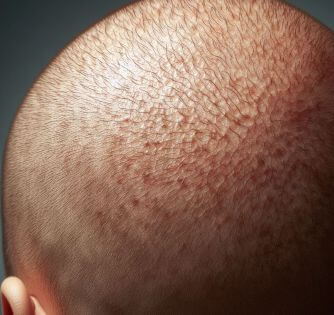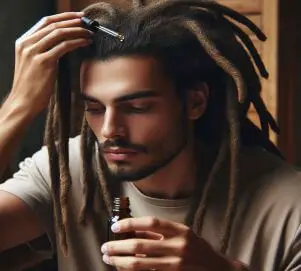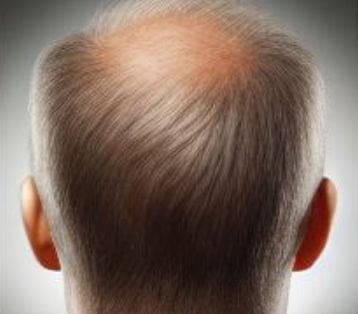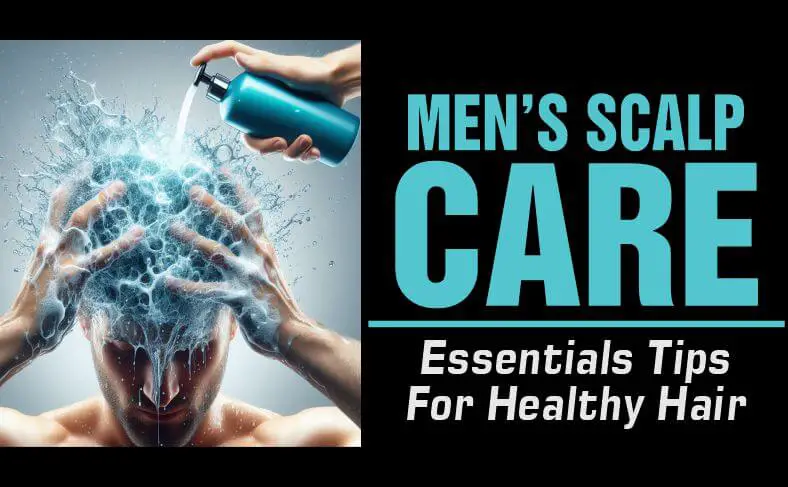Last updated on July 6th, 2025 at 04:08 pm
Discover essential tips for men’s scalp care to promote healthy hair by addressing common concerns for optimal scalp health.
When it comes to personal grooming, men often focus on their facial hair, body hair, and general skin care regimen.
However, one area that is often overlooked or neglected is the scalp.
A healthy scalp is the foundation for healthy hair, and taking care of it is vital for maintaining strong, shiny locks.
In this article, we will explore the importance of men’s scalp care and provide essential tips for achieving optimal hair health.
Recommended: Basics of Beard Care and Grooming
Importance of Scalp Care for Men
The scalp is the skin on the head that is covered by hair follicles. It plays a crucial role in hair growth and overall hair health.
Neglecting scalp care can lead to various hair problems such as dandruff, itchiness, hair loss, and an overall unhealthy appearance.
Maintaining a clean and well-nourished scalp is essential for preventing these issues and promoting healthy hair growth.
The importance of scalp care for men lies in maintaining overall hair health and addressing common scalp issues.
Here are some key points:
1. Healthy Hair Growth: A well-nourished scalp promotes healthy hair growth and prevents issues such as hair thinning and balding.
2. Preventing Scalp Conditions: Proper scalp care can help prevent common conditions like dandruff, dry scalp, and excess oiliness, which can be uncomfortable and affect confidence.
3. Maintaining Hygiene: Regular scalp care helps in maintaining scalp hygiene, reducing the risk of infections and unpleasant odors.
4. Enhancing Appearance: A healthy scalp contributes to overall grooming and appearance, making men feel more confident and presentable.
5. Addressing Hair Loss: Scalp care can play a role in addressing hair loss issues, promoting thicker and fuller hair.
Related: Some Grooming Habits Men Neglect
Understanding the Scalp

Understanding the scalp is crucial for effective scalp care.
Here’s a brief explanation of the key points:
1. Anatomy of the Scalp
The scalp is the skin covering the top of the head, consisting of layers that include the epidermis, dermis, and subcutaneous tissue.
It contains hair follicles, sebaceous glands, blood vessels, and nerve endings.
Understanding this anatomy is important for recognizing how the scalp functions and how to care for it effectively.
2. Common Scalp Issues Faced by Men
Men commonly face scalp issues such as dandruff, dry scalp, oily scalp, itching, and in some cases, hair loss.
Understanding these issues involves recognizing their causes, symptoms, and potential treatments.
Factors such as genetics, hygiene, diet, and stress can contribute to these problems, and understanding them is essential for addressing scalp health effectively.
Related: Essential Grooming Tools for Every Man
Daily Men’s Scalp Care Routine
1. Proper Cleaning Routine
Regularly washing your hair and scalp is the foundation of good scalp care.
Men should aim to wash their hair every 2-3 days, depending on their hair type and lifestyle.
Using a gentle and sulfate-free shampoo specifically designed for men’s hair is recommended.
It is important to thoroughly rinse out all product residue to prevent buildup, which can clog hair follicles and lead to scalp issues.
Avoid using hot water, as it can strip the scalp of its natural oils, which are essential for good hair health.
Related: Misconceptions about Men’s Grooming You Should Ignore
2. Exfoliation for Scalp Health
Exfoliating the scalp is an effective way to remove dead skin cells and unclog hair follicles.
This process stimulates blood circulation, promoting healthy hair growth. There are several ways to exfoliate the scalp.
One method is to use a scalp scrub or brush to gently massage the scalp in circular motions before shampooing.
Another option is to use a clarifying shampoo with exfoliating properties, which helps to remove buildup and maintain a healthy scalp environment.
3. Avoid Overuse of Styling Products
While styling products can enhance your hairstyle, excessive use can weigh down your hair and create buildup on the scalp.
This buildup can lead to scalp issues and hinder healthy hair growth.
Therefore, it is crucial to use styling products in moderation and ensure they are thoroughly washed out after use.
Additionally, opt for water-based or natural products that are less likely to cause irritation or clog hair follicles.
Related: Impact of Grooming on Men’s Psyche
4. Control Dandruff and Itchiness
Dandruff and itchiness are common scalp problems that can be both embarrassing and uncomfortable.
To combat these issues, it is important to maintain a clean and balanced scalp.
Using a medicated anti-dandruff shampoo can help control dandruff and soothe itchiness.
Look for shampoos containing ingredients such as zinc pyrithione, ketoconazole, or coal tar, which effectively target dandruff-causing fungi or regulate excessive sebum production.
Remember to follow the instructions on the packaging for optimal results.
5. Moisturize the Scalp
Just like the skin on the face and body, the scalp requires moisture to stay healthy.
Dry scalp can lead to flakiness, itchiness, and dandruff.
To moisturize the scalp, use natural oils such as jojoba, almond, or coconut oil.
Apply a small amount of oil to the scalp and gently massage it in, paying extra attention to any dry areas.
Leave the oil on for a few hours or overnight before shampooing as usual.
Regular moisturization will help maintain a healthy scalp environment and promote hair growth.
Related: Anti-aging Haircare Products of Senior Men Over 60
6. Protect Your Scalp from the Sun
The scalp is often overlooked when it comes to sun protection.
However, prolonged sun exposure can damage the scalp, leading to dryness, sunburn, and even skin cancer.
To protect your scalp, wear a hat or cap when exposed to the sun for extended periods.
If wearing headwear is not an option, consider using a sunscreen specifically designed for the scalp.
These sunscreens are lightweight, non-greasy, and easily absorbed, ensuring protection without leaving a residue.
7. Healthy Lifestyle Habits
Maintaining a healthy lifestyle goes hand in hand with scalp care.
Factors such as nutrition, stress levels, and overall well-being can directly impact the health of your scalp and hair.
A well-balanced diet that includes essential vitamins and minerals, such as biotin, vitamin E, and omega-3 fatty acids, can promote hair growth and strengthen the scalp.
Additionally, managing stress levels through regular exercise, relaxation techniques, and a good sleep routine can improve scalp health and prevent hair loss.
Related: How to Grow a Goatee Beard
Nourishing the Scalp

Nourishing the scalp is essential for maintaining healthy hair and addressing common scalp issues.
1. Incorporating Essential Oils and Serums
Essential oils such as tea tree oil, peppermint oil, and rosemary oil can be beneficial for scalp health.
These oils have antimicrobial and soothing properties that can help alleviate scalp conditions like dandruff and dryness.
Additionally, using serums containing ingredients like vitamin E or argan oil can provide nourishment and hydration to the scalp.
2. Dietary Considerations for Scalp Health
A balanced diet rich in essential nutrients such as vitamins A, C, E, and biotin can promote scalp health and hair growth.
Foods like leafy greens, nuts, seeds, and fish contain nutrients that support scalp nourishment and overall hair health.
3. Benefits of Scalp Massages and Treatments
Scalp massages can improve blood circulation, which in turn promotes hair growth and scalp health.
Additionally, treatments such as exfoliation or deep conditioning can help remove buildup and nourish the scalp, leading to healthier, more resilient hair.
Related: Introduction to Men’s Haircuts
Addressing Scalp Concerns

Addressing men’s scalp concerns is essential for maintaining healthy hair and scalp.
1. Dealing with Dandruff and Dry Scalp
Men can address dandruff and dry scalp by using anti-dandruff shampoos containing ingredients like ketoconazole, selenium sulfide, or tea tree oil.
These ingredients help to combat the fungus associated with dandruff and soothe dry, flaky scalp.
Regular use of moisturizing conditioners and scalp treatments can also help alleviate dryness and itchiness.
2. Managing Oily Scalp and Hair
Men with oily scalp and hair can manage this concern by using clarifying shampoos that help control excess oil production without stripping the scalp.
It’s important to avoid heavy, oil-based hair products and to wash the hair regularly with lukewarm water.
Additionally, incorporating scalp treatments with ingredients like salicylic acid can help regulate oil production.
3. Understanding Hair Loss and Thinning
Men experiencing hair loss and thinning should consider consulting a dermatologist or trichologist to understand the underlying causes.
Treatments such as minoxidil, finasteride, or low-level laser therapy may be recommended based on the specific cause of hair loss.
Additionally, maintaining a healthy lifestyle, managing stress, and using volumizing hair products can help address the appearance of thinning hair.
Related: Types of High and Tight Fade Haircut for Men
Lifestyle and Men’s Scalp Health
Lifestyle plays a significant role in men’s scalp health. This is an area men overlook.
Men hardly consider the impact of their lifestyle on the health of their scalp and hair.
Let’s take a closer look:
1. Impact of Stress and Sleep on Scalp Health
High stress levels can contribute to scalp issues such as dandruff, itchiness, and hair loss.
Chronic stress may disrupt the natural hair growth cycle, leading to increased shedding.
Adequate sleep is essential for overall health, including scalp health, as it allows the body to repair and regenerate.
Managing stress through relaxation techniques and ensuring sufficient sleep can positively impact scalp health.
2. Exercise and Its Influence on Scalp Circulation
Regular exercise promotes overall blood circulation, including to the scalp.
Improved circulation can deliver essential nutrients to the hair follicles, promoting healthy hair growth.
Additionally, sweating during exercise can help unclog hair follicles and remove impurities from the scalp.
3. Avoiding Harmful Habits for Scalp and Hair
Certain habits, such as smoking, excessive alcohol consumption, and poor dietary choices, can negatively impact scalp and hair health.
Smoking, for example, can constrict blood vessels, potentially reducing blood flow to the scalp.
Unhealthy dietary habits can lead to nutrient deficiencies that affect hair quality.
Avoiding these harmful habits and maintaining a balanced, nutrient-rich diet can contribute to improved scalp and hair health.
Related: Men’s Hairstyles Guide for Every Face Type
When to Seek Professional Help
Seeking professional help is crucial for men’s scalp care, especially when scalp issues worsen.
Here are things to consider:
1. When to Consult a Dermatologist or Trichologist
Men should consider consulting a dermatologist or trichologist if they experience persistent scalp issues such as severe dandruff, itching, unusual hair loss, or scalp conditions that do not improve with over-the-counter treatments.
These specialists can diagnose underlying scalp conditions, provide personalized treatment plans, and offer expert advice on maintaining scalp health.
2. Understanding Scalp Treatments and Therapies
Dermatologists and trichologists can recommend various scalp treatments and therapies tailored to specific scalp concerns.
These may include medicated shampoos, scalp serums, corticosteroid injections for certain conditions, light therapy, or oral medications for hair loss.
Understanding the available treatments and their potential benefits is essential for addressing scalp issues effectively.
3. Importance of Regular Scalp Check-ups
Regular scalp check-ups with a dermatologist or trichologist are important for monitoring scalp health, identifying early signs of scalp conditions, and adjusting treatment plans as needed.
These professionals can also guide preventive measures and lifestyle adjustments to maintain optimal scalp health.
Frequently Asked Questions
How do you take care of your scalp for healthy hair?
Care for your scalp by using a gentle shampoo, massaging it during washing, and keeping it hydrated with proper conditioning.
How can I improve my scalp quality?
Improve scalp quality by maintaining a balanced diet, using suitable hair products, avoiding excessive heat styling, and seeking professional advice when needed.
How often should I wash my hair to improve scalp quality?
Washing hair 2-3 times a week is generally recommended. Adjust based on scalp oiliness, using a gentle shampoo to maintain scalp health.
Can diet affect scalp quality?
Yes, a balanced diet rich in vitamins, minerals, and protein supports scalp health and hair growth. Incorporate nutrient-dense foods for optimal scalp quality.
Are there specific scalp treatments to improve quality?
Yes, scalp treatments like exfoliating scrubs, moisturizing masks, and essential oil massages can nourish the scalp, promote circulation, and improve overall scalp quality.
Final Word from Gentsways
Men’s scalp care is essential for maintaining healthy hair.
With proper cleaning routines, exfoliation, controlling dandruff, moisturization, sun protection, and a healthy lifestyle, men can achieve an optimal scalp environment for strong, shiny locks.
By dedicating a little extra attention to their scalp, men can ensure long-lasting hair health and avoid common scalp problems.
References:
- https://www.headandshoulders.com.au/en-au/healthy-hair-and-scalp/hair-care/hair-care-for-men
- https://eighteeneight.com/san-diego-ca/healthy-scalp-tips-for-men/
Pyo Merez is a men’s lifestyle enthusiast and writer about the gentleman’s place and impact on society. Raised by a distinguished gentleman dad, he offers unique insights into how the mind of a gentleman works and how societal norms shape gentlemen’s identity and vice versa.
Through his insightful articles, Pyo taps into the depths of gentleman culture to provide perspectives on etiquette and manners in modern society.

